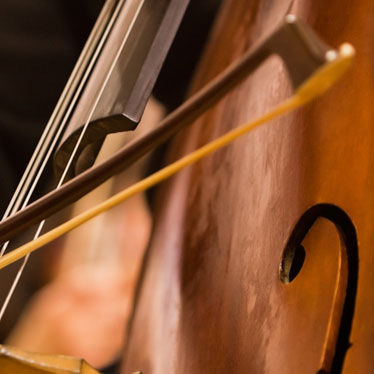Double Bass Practice Do's And Don'ts

The double bass is a tough master – demanding strength, stamina and proper technique from its player. As the root of the orchestra, musical and rhythmic accuracy are imperative to the success of the whole – requiring plenty of practice and repetition.
Of course, you have to practice well in order to develop the right techniques so, while regular practice matters, it matters even more that you prioritize practicing the fundamentals and proper techniques to become an accomplished double bass player.
Make sure your instrument is accurately sized
Have the opportunity to use an old double bass you found at a yard sale or hanging around a family-friend's basement? Not so fast.
DO make sure the instrument is sized correctly for your body and proportions. This is the only way to ensure you maintain ergonomically correct postures while playing, and that you're physically able to play with correct shoulder, arm, and wrist/hand positions, bowing techniques, etc.
DON'T spend time playing a bass that's the wrong fit. If the instrument isn't correctly-sized for your body, you'll have a difficult time honoring correct techniques because angles and fingering positions will be all off. At best, this will affect your overall playing and make it more difficult for you to adjust when you finally get an instrument that's sized correctly; at worst, you'll be prone to discomfort and potential injury.
Practice enough, but not too much
Believe it or not, practicing too much can do more harm than good.
DO practice regularly - but concentrate more on the focus and goals of your practice session, so you're practicing with a purpose. Shorter, deliberate practice sessions are far more productive than longer practices on autopilot.
DON'T over-practice. In most cases, particularly for new students, 30- to 60-minutes of practice per day are more than enough. If you practice more than that - and without regular, structured input from an instructor, you'll wind up creating bad habits or, worse, suffer from overuse injury.
Practice logs keep you on task
Practice logs are excellent tools to track what you're working on, how you're dedicating certain portions of the practice times, measures or phrases that need more work, etc. Reviewing these logs on a weekly, or bi-weekly basis allows you to see which practice points could use more work, and which ones are being overworked.
DO keep a practice log every time you practice. Before sitting down, think about what you want to focus on for the practice session. Are you working on fingering positions? Bowing techniques? Challenging sections of a new piece? A particular expressive style?
DON'T just practice on autopilot. Many musicians get into autopilot mode, practicing the same things, for the same amount of time, in the same order. This is monotonous, to say the least, and will ultimately inhibit you from becoming the nuanced and expressive musician you desire to be.
Make friends with the metronome
Your solo playing will reflect whether or not you practice with a metronome.
Metronomes are integral to any musician's practice, but they're especially important for bass players as you are often "the keepers of the rhythm" yourselves.
DO practice with a metronome at all times. This builds "muscle and ear memory" for rhythm and specific tempos. Slower metronome tempos will help you learn new music that can then be notched up as you become more proficient. A metronome also helps to structure your practice session.
DON'T let the metronome sit idle. You may think you're keeping good rhythm but music teachers (and orchestra conductors) can quickly tell who practices with metronomes and who doesn't.
Maintain accurate tuning
Routinely checking/adjusting double bass tuning improves musicianship.
DO tune your bass regularly, and re-check tuning every 15-minutes or so during your practices. Good tuning is a must to develop well-trained ears, not to mention protecting the ears of your future audience.
DON'T assume "close enough" is good enough. Your freshly tuned instrument should be spot-on. The idea of "close enough" is a recipe for sour intonation, which compromises your ability to develop higher standards of pitch.
Make time for improvisation
Improvisation skills are important for all string musicians, but they're especially important for an instrument like the double bass, which is used in multiple, varied genres of music.
DO incorporate improv exercises into many, if not all, of your practice times. In addition to learning a valuable music skill, you'll also have an easier time flowing between genres. Read, Tips for Learning to Play Jazz & Upright Slap on your Bass, to get started.
DON'T forget to maintain healthy posture and techniques while improvising. The same rules for avoiding overuse injuries apply.
Double bass players are in high demand and these bass practice do's and don'ts will help you develop musical standards that set you apart from your fellow, bass playing competitors.


